Princeton Asian American Students Association
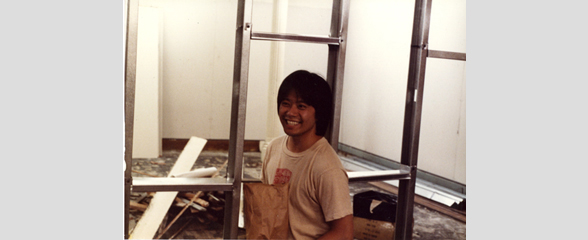
2021.022.001-1 Interview with Charlie Lai July 20, 2012
Charlie Lai along with Jack Tchen are founders of the Chinatown History Project, which has gone on to become the Museum of Chinese in America. In this five part interview conducted over the course of several months Charlie talks about his childhood in Hong Kong and how his family eventually decided to immigrate to the United States when he was nine years old. He talks about living with his uncle when they first arrive in the states and saying on Long Island. His family eventually moves into their own place in Manhattan. Later he recounts his time at Princeton and his community organizing effort to recruit more Asian students to the school even though he was not fond of the institution. While still a student at Princeton he spent summers working at Basement Workshop, which was where he met Jack Tchen. Basement had many issues with inter office politics and eventually closed. Charlie and Jack began discussing ideas, which would turn into the Chinatown History Project at 70 Mulberry Street. Charlie eventually steps down as executive director of the museum because he didn’t feel he could take it to the next level. But is called back when his replacement Fay Chew needs his help in growing the organization into a bigger space. Charlie recounts in depth his fundraising efforts with Maya Lin in the wake of the 9-11 attack to try and find the museum a new home, which ends up being 215 Centre Street. He makes mention of his personal life and marriage to Pat, whom he met while community organizing in college. After leaving the museum for a second time Charlie talks about working a few months at the Chinatown Manpower Project.
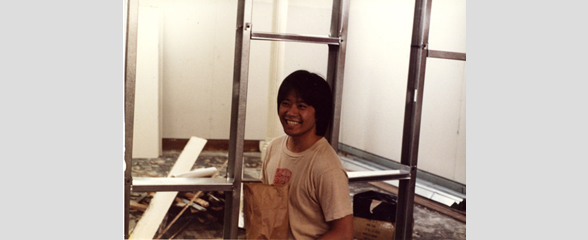
2021.022.001-2 Interview with Charlie Lai July 23, 2012
Charlie Lai along with Jack Tchen are founders of the Chinatown History Project, which has gone on to become the Museum of Chinese in America. In this five part interview conducted over the course of several months Charlie talks about his childhood in Hong Kong and how his family eventually decided to immigrate to the United States when he was nine years old. He talks about living with his uncle when they first arrive in the states and saying on Long Island. His family eventually moves into their own place in Manhattan. Later he recounts his time at Princeton and his community organizing effort to recruit more Asian students to the school even though he was not fond of the institution. While still a student at Princeton he spent summers working at Basement Workshop, which was where he met Jack Tchen. Basement had many issues with inter office politics and eventually closed. Charlie and Jack began discussing ideas, which would turn into the Chinatown History Project at 70 Mulberry Street. Charlie eventually steps down as executive director of the museum because he didn’t feel he could take it to the next level. But is called back when his replacement Fay Chew needs his help in growing the organization into a bigger space. Charlie recounts in depth his fundraising efforts with Maya Lin in the wake of the 9-11 attack to try and find the museum a new home, which ends up being 215 Centre Street. He makes mention of his personal life and marriage to Pat, whom he met while community organizing in college. After leaving the museum for a second time Charlie talks about working a few months at the Chinatown Manpower Project.
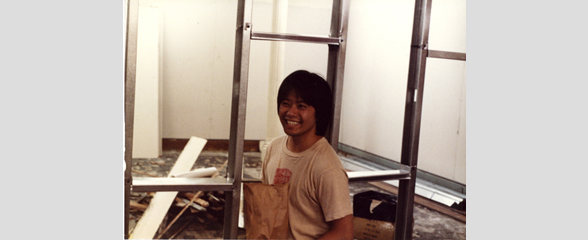
2021.022.001-3 Interview with Charlie Lai July 27, 2012
Charlie Lai along with Jack Tchen are founders of the Chinatown History Project, which has gone on to become the Museum of Chinese in America. In this five part interview conducted over the course of several months Charlie talks about his childhood in Hong Kong and how his family eventually decided to immigrate to the United States when he was nine years old. He talks about living with his uncle when they first arrive in the states and saying on Long Island. His family eventually moves into their own place in Manhattan. Later he recounts his time at Princeton and his community organizing effort to recruit more Asian students to the school even though he was not fond of the institution. While still a student at Princeton he spent summers working at Basement Workshop, which was where he met Jack Tchen. Basement had many issues with inter office politics and eventually closed. Charlie and Jack began discussing ideas, which would turn into the Chinatown History Project at 70 Mulberry Street. Charlie eventually steps down as executive director of the museum because he didn’t feel he could take it to the next level. But is called back when his replacement Fay Chew needs his help in growing the organization into a bigger space. Charlie recounts in depth his fundraising efforts with Maya Lin in the wake of the 9-11 attack to try and find the museum a new home, which ends up being 215 Centre Street. He makes mention of his personal life and marriage to Pat, whom he met while community organizing in college. After leaving the museum for a second time Charlie talks about working a few months at the Chinatown Manpower Project.
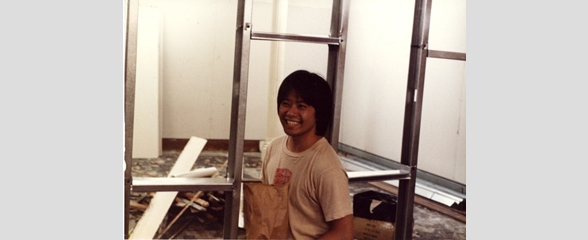
2021.022.001-4 Interview with Charlie Lai July 27, 2012
Charlie Lai along with Jack Tchen are founders of the Chinatown History Project, which has gone on to become the Museum of Chinese in America. In this five part interview conducted over the course of several months Charlie talks about his childhood in Hong Kong and how his family eventually decided to immigrate to the United States when he was nine years old. He talks about living with his uncle when they first arrive in the states and saying on Long Island. His family eventually moves into their own place in Manhattan. Later he recounts his time at Princeton and his community organizing effort to recruit more Asian students to the school even though he was not fond of the institution. While still a student at Princeton he spent summers working at Basement Workshop, which was where he met Jack Tchen. Basement had many issues with inter office politics and eventually closed. Charlie and Jack began discussing ideas, which would turn into the Chinatown History Project at 70 Mulberry Street. Charlie eventually steps down as executive director of the museum because he didn’t feel he could take it to the next level. But is called back when his replacement Fay Chew needs his help in growing the organization into a bigger space. Charlie recounts in depth his fundraising efforts with Maya Lin in the wake of the 9-11 attack to try and find the museum a new home, which ends up being 215 Centre Street. He makes mention of his personal life and marriage to Pat, whom he met while community organizing in college. After leaving the museum for a second time Charlie talks about working a few months at the Chinatown Manpower Project.
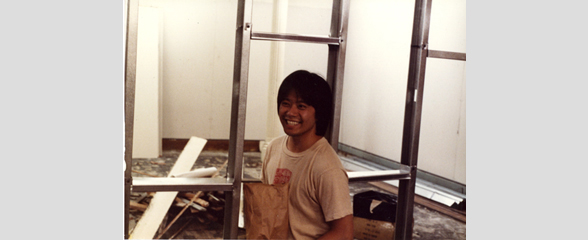
2021.022.001-5 Interview with Charlie Lai August 9, 2012
Charlie Lai along with Jack Tchen are founders of the Chinatown History Project, which has gone on to become the Museum of Chinese in America. In this five part interview conducted over the course of several months Charlie talks about his childhood in Hong Kong and how his family eventually decided to immigrate to the United States when he was nine years old. He talks about living with his uncle when they first arrive in the states and saying on Long Island. His family eventually moves into their own place in Manhattan. Later he recounts his time at Princeton and his community organizing effort to recruit more Asian students to the school even though he was not fond of the institution. While still a student at Princeton he spent summers working at Basement Workshop, which was where he met Jack Tchen. Basement had many issues with inter office politics and eventually closed. Charlie and Jack began discussing ideas, which would turn into the Chinatown History Project at 70 Mulberry Street. Charlie eventually steps down as executive director of the museum because he didn’t feel he could take it to the next level. But is called back when his replacement Fay Chew needs his help in growing the organization into a bigger space. Charlie recounts in depth his fundraising efforts with Maya Lin in the wake of the 9-11 attack to try and find the museum a new home, which ends up being 215 Centre Street. He makes mention of his personal life and marriage to Pat, whom he met while community organizing in college. After leaving the museum for a second time Charlie talks about working a few months at the Chinatown Manpower Project.
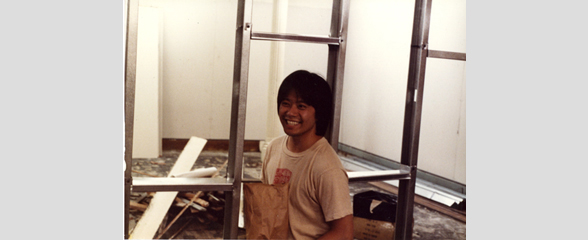
2021.022.001-6 Interview with Charlie Lai October 11, 2012
Charlie Lai along with Jack Tchen are founders of the Chinatown History Project, which has gone on to become the Museum of Chinese in America. In this five part interview conducted over the course of several months Charlie talks about his childhood in Hong Kong and how his family eventually decided to immigrate to the United States when he was nine years old. He talks about living with his uncle when they first arrive in the states and saying on Long Island. His family eventually moves into their own place in Manhattan. Later he recounts his time at Princeton and his community organizing effort to recruit more Asian students to the school even though he was not fond of the institution. While still a student at Princeton he spent summers working at Basement Workshop, which was where he met Jack Tchen. Basement had many issues with inter office politics and eventually closed. Charlie and Jack began discussing ideas, which would turn into the Chinatown History Project at 70 Mulberry Street. Charlie eventually steps down as executive director of the museum because he didn’t feel he could take it to the next level. But is called back when his replacement Fay Chew needs his help in growing the organization into a bigger space. Charlie recounts in depth his fundraising efforts with Maya Lin in the wake of the 9-11 attack to try and find the museum a new home, which ends up being 215 Centre Street. He makes mention of his personal life and marriage to Pat, whom he met while community organizing in college. After leaving the museum for a second time Charlie talks about working a few months at the Chinatown Manpower Project.